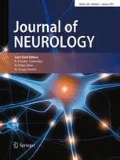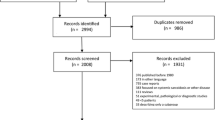Abstract
Central nervous system localizations of sarcoidosis may be refractory to conventional treatment such as steroids and immunosuppressive drugs. Infliximab, a TNF-α antagonist chimeric antibody, has been shown to be effective for treatment of these localizations. The aim of this study was to evaluate the efficacy and safety, in particular the long-term outcomes, of the use of infliximab for the treatment of neurosarcoidosis. We retrospectively reviewed medical records of patients with neurosarcoidosis who had been treated with infliximab between 2009 and 2015. All patients had histologically proven non-caseating granulomas. Eighteen patients with histologically proven sarcoidosis were included in this study. All had neurological involvement consisting of meningeal (n = 16), cerebral (n = 10), spinal cord (n = 6), and/or optic nerve (n = 5) involvement. Sixteen patients had previously received at least one immunosuppressive drug in addition to corticosteroids, including cyclophosphamide in 11 patients. All patients received treatment with infliximab (3–7.5 mg/kg) associated with corticosteroids (n = 18), low-dose methotrexate (n = 15), azathioprine (n = 2), or mycophenolate (n = 1). Sixteen out of 18 patients improved clinically (initial median modified Rankin scale score of 3, final median score of 1; p < 0.0001). At 6 months after initiation of infliximab, six patients obtained complete remission (33%), ten attained partial remission (56%), and two had stable disease (11%). The median follow-up time was 20 months (range 6–93). Nine patients relapsed during follow-up (50%). Eight patients developed toxic side effects and seven of these side effects were infectious events. Infliximab is an efficacious treatment of refractory neurosarcoidosis. However, relapses frequently occurred during follow-up.

Similar content being viewed by others
References
Baughman RP, Drent M, Kavuru M, Judson MA, Costabel U, du Bois R, Albera C, Brutsche M, Davis G, Donohue JF, Muller-Quernheim J, Schlenker-Herceg R, Flavin S, Lo KH, Oemar B, Barnathan ES, Sarcoidosis I (2006) Infliximab therapy in patients with chronic sarcoidosis and pulmonary involvement. Am J Respir Crit Care Med 174:795–802
Baughman RP, Winget DB, Lower EE (2000) Methotrexate is steroid sparing in acute sarcoidosis: results of a double blind, randomized trial. Sarcoidosis Vasc Diffus Lung Dis Off J Wasog/World Assoc Sarcoidosis Other Granul Disord 17:60–66
Carter JD, Valeriano J, Vasey FB, Bognar B (2004) Refractory neurosarcoidosis: a dramatic response to infliximab. Am J Med 117:277–279
Chintamaneni S, Patel AM, Pegram SB, Patel H, Roppelt H (2010) Dramatic response to infliximab in refractory neurosarcoidosis. Ann Indian Acad Neurol 13:207–210
Cinetto F, Agostini C (2016) Advances in understanding the immunopathology of sarcoidosis and implications on therapy. Expert Rev Clin Immunol 12(9):973–988
Delaney P (1977) Neurologic manifestations in sarcoidosis: review of the literature, with a report of 23 cases. Ann Intern Med 87:336–345
Drent M, Cremers JP, Jansen TL, Baughman RP (2014) Practical eminence and experience-based recommendations for use of TNF-alpha inhibitors in sarcoidosis. Sarcoidosis Vasc Diffus Lung Dis Off J Wasog/World Assoc Sarcoidosis Other Granul Disord 31:91–107
Ferriby D, de Seze J, Stojkovic T, Hachulla E, Wallaert B, Destee A, Hatron PY, Vermersch P (2001) Long-term follow-up of neurosarcoidosis. Neurology 57:927–929
Judson MA, Baughman RP, Costabel U, Flavin S, Lo KH, Kavuru MS, Drent M, Centocor TSI (2008) Efficacy of infliximab in extrapulmonary sarcoidosis: results from a randomised trial. Euro Respir J 31:1189–1196
Kobylecki C, Shaunak S (2007) Refractory neurosarcoidosis responsive to infliximab. Pract Neurol 7:112–115
Lorentzen AO, Sveberg L, Midtvedt O, Kerty E, Heuser K (2014) Overnight response to infliximab in neurosarcoidosis: a case report and review of infliximab treatment practice. Clin Neuropharmacol 37:142–148
Lower EE, Broderick JP, Brott TG, Baughman RP (1997) Diagnosis and management of neurological sarcoidosis. Arch Intern Med 157:1864–1868
Luke RA, Stern BJ, Krumholz A, Johns CJ (1987) Neurosarcoidosis: the long-term clinical course. Neurology 37:461–463
Moravan M, Segal BM (2009) Treatment of CNS sarcoidosis with infliximab and mycophenolate mofetil. Neurology 72:337–340
Morcos Z (2003) Refractory neurosarcoidosis responding to infliximab. Neurology 60:1220–1221
O’Reilly MW, Sexton DJ, Dennedy MC, Counihan TJ, Finucane FM, O’Brien T, O’Regan AW (2015) Radiological remission and recovery of thirst appreciation after infliximab therapy in adipsic diabetes insipidus secondary to neurosarcoidosis. QJM Mon J Assoc Phys 108:657–659
Pereira J, Anderson NE, McAuley D, Bergin P, Kilfoyle D, Fink J (2011) Medically refractory neurosarcoidosis treated with infliximab. Intern Med J 41:354–357
Pettersen JA, Zochodne DW, Bell RB, Martin L, Hill MD (2002) Refractory neurosarcoidosis responding to infliximab. Neurology 59:1660–1661
Santos E, Shaunak S, Renowden S, Scolding NJ (2010) Treatment of refractory neurosarcoidosis with Infliximab. J Neurol Neurosurg Psychiatry 81:241–246
Sollberger M, Fluri F, Baumann T, Sonnet S, Tamm M, Steck AJ, Brutsche M (2004) Successful treatment of steroid-refractory neurosarcoidosis with infliximab. J Neurol 251:760–761
Valeyre D, Prasse A, Nunes H, Uzunhan Y, Brillet PY, Muller-Quernheim J (2014) Sarcoidosis. Lancet 383:1155–1167
Vorselaars AD, Verwoerd A, van Moorsel CH, Keijsers RG, Rijkers GT, Grutters JC (2014) Prediction of relapse after discontinuation of infliximab therapy in severe sarcoidosis. Euro Respir J 43:602–609
Zajicek JP, Scolding NJ, Foster O, Rovaris M, Evanson J, Moseley IF, Scadding JW, Thompson EJ, Chamoun V, Miller DH, McDonald WI, Mitchell D (1999) Central nervous system sarcoidosis–diagnosis and management. QJM Month J Assoc Phys 92:103–117
Author information
Authors and Affiliations
Corresponding author
Ethics declarations
Conflicts of interest
The authors declare no conflicts of interest and no disclosures relevant to the manuscript. This work did not receive any funding.
Rights and permissions
About this article
Cite this article
Cohen Aubart, F., Bouvry, D., Galanaud, D. et al. Long-term outcomes of refractory neurosarcoidosis treated with infliximab. J Neurol 264, 891–897 (2017). https://doi.org/10.1007/s00415-017-8444-9
Received:
Revised:
Accepted:
Published:
Issue Date:
DOI: https://doi.org/10.1007/s00415-017-8444-9




